BMG744: Leadership Models of Authentic vs. Ethical Leadership
VerifiedAdded on 2023/01/12
|8
|2293
|49
Essay
AI Summary
This essay delves into the contrasting leadership models of authentic and ethical leadership, examining their core principles and practical applications. The paper begins by defining authentic leadership as a style rooted in self-awareness, transparency, and genuine behavior, emphasizing the leader's ability to inspire trust and motivate employees. It highlights the strengths of authentic leadership, such as fostering relational transparency and ethical decision-making, while also acknowledging potential weaknesses like the difficulty of maintaining authenticity in fast-paced environments. The essay then explores ethical leadership, which emphasizes adherence to organizational values and legal regulations, creating a healthy workplace culture. The strengths of ethical leadership include promoting a supportive environment and minimizing harm within the organization. However, the analysis also addresses weaknesses, such as the potential for increased implementation costs and the need for consistent monitoring. The essay uses academic literature to support its arguments, and concludes with a recommendation for the most suitable leadership model for contemporary business environments, providing justification for the choice. The provided references support the analysis of both leadership models.
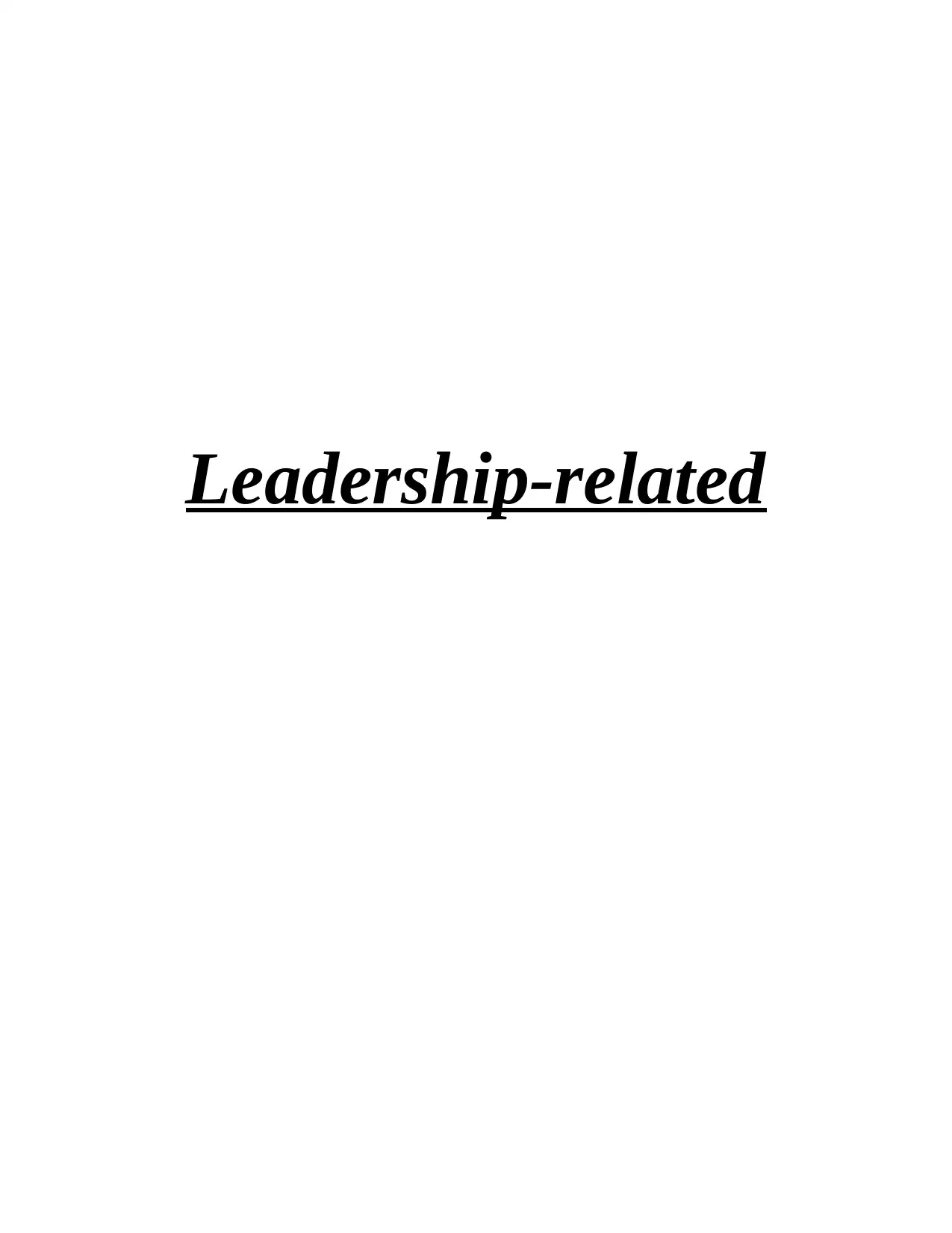
Leadership-related
Paraphrase This Document
Need a fresh take? Get an instant paraphrase of this document with our AI Paraphraser
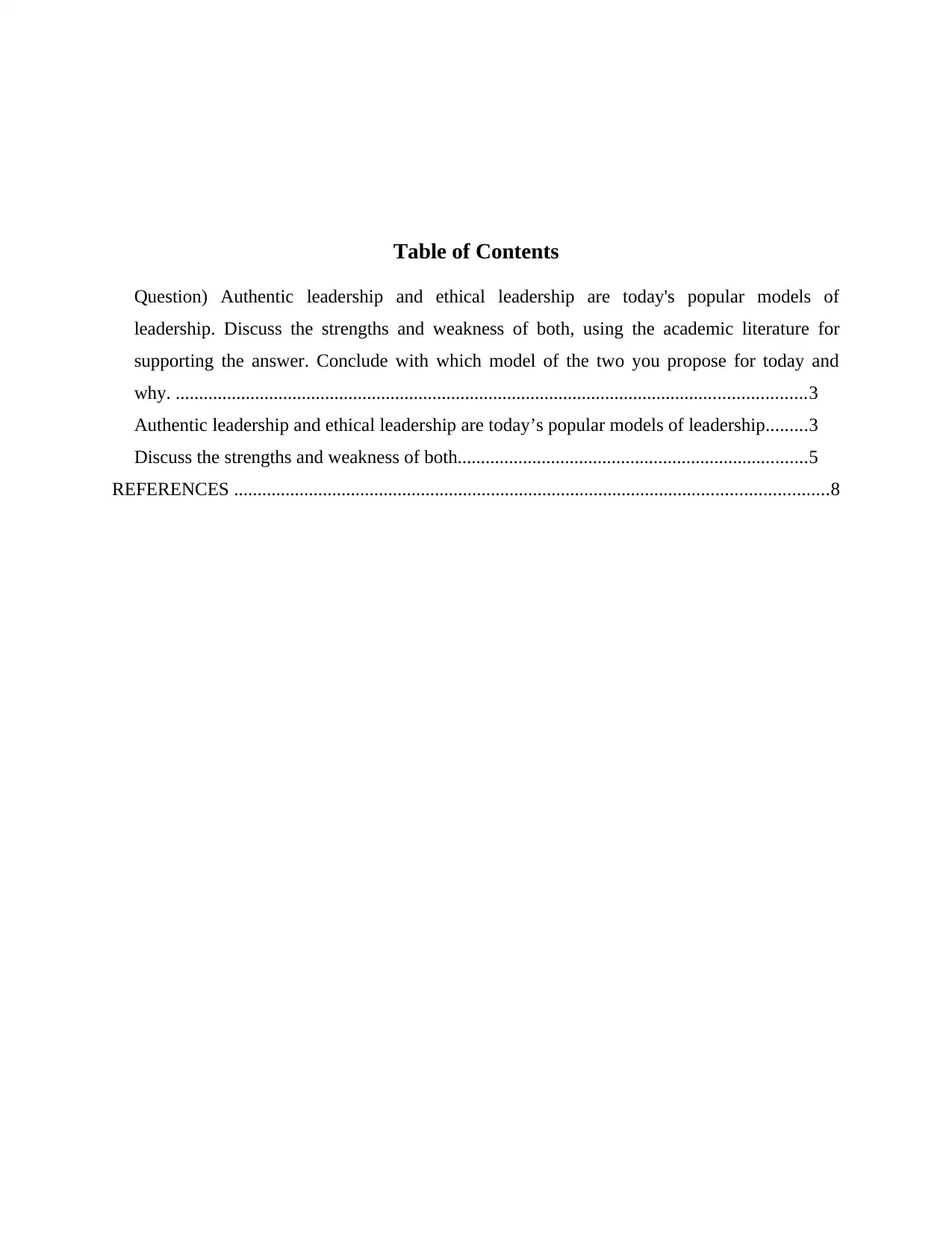
Table of Contents
Question) Authentic leadership and ethical leadership are today's popular models of
leadership. Discuss the strengths and weakness of both, using the academic literature for
supporting the answer. Conclude with which model of the two you propose for today and
why. .......................................................................................................................................3
Authentic leadership and ethical leadership are today’s popular models of leadership.........3
Discuss the strengths and weakness of both...........................................................................5
REFERENCES ...............................................................................................................................8
Question) Authentic leadership and ethical leadership are today's popular models of
leadership. Discuss the strengths and weakness of both, using the academic literature for
supporting the answer. Conclude with which model of the two you propose for today and
why. .......................................................................................................................................3
Authentic leadership and ethical leadership are today’s popular models of leadership.........3
Discuss the strengths and weakness of both...........................................................................5
REFERENCES ...............................................................................................................................8
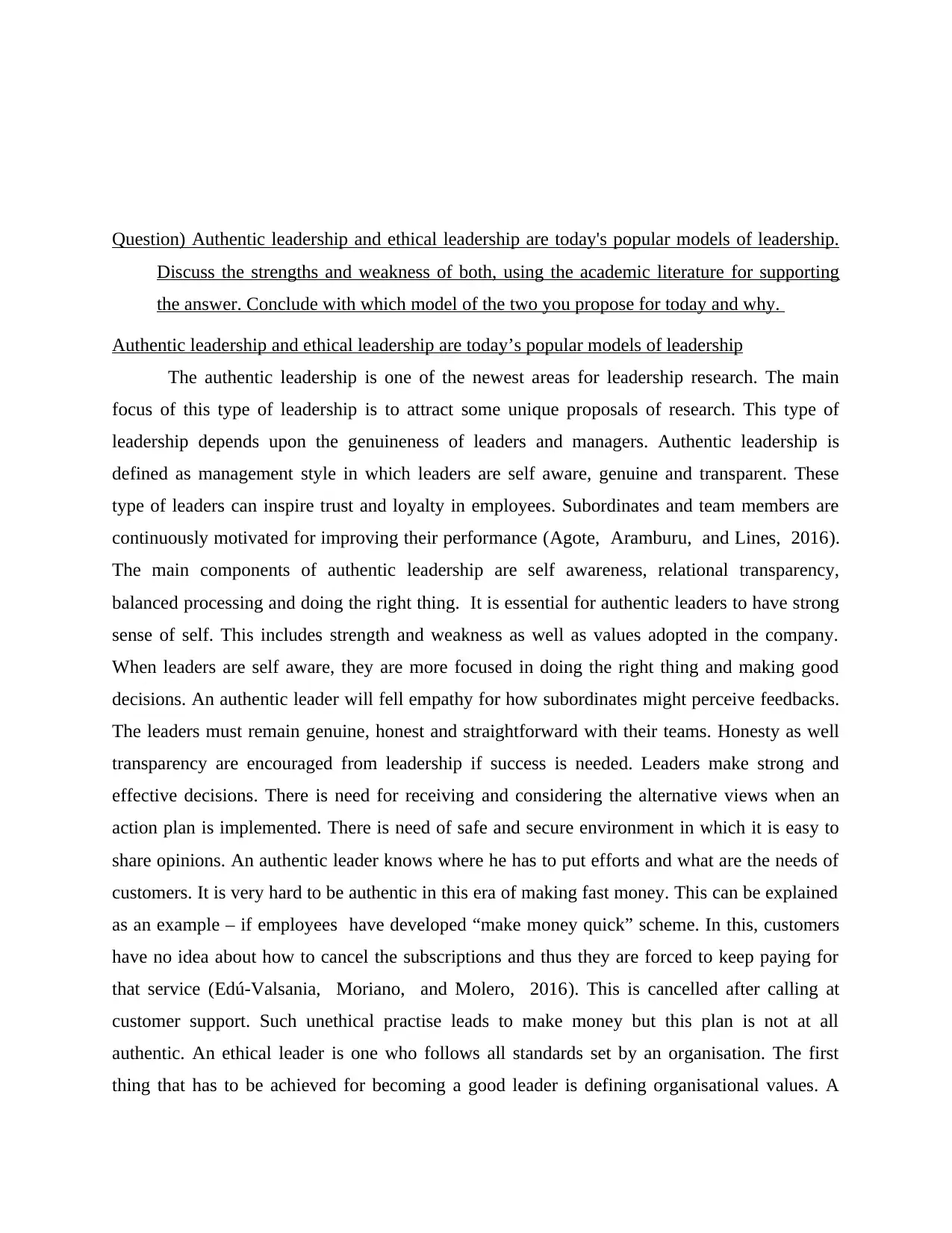
Question) Authentic leadership and ethical leadership are today's popular models of leadership.
Discuss the strengths and weakness of both, using the academic literature for supporting
the answer. Conclude with which model of the two you propose for today and why.
Authentic leadership and ethical leadership are today’s popular models of leadership
The authentic leadership is one of the newest areas for leadership research. The main
focus of this type of leadership is to attract some unique proposals of research. This type of
leadership depends upon the genuineness of leaders and managers. Authentic leadership is
defined as management style in which leaders are self aware, genuine and transparent. These
type of leaders can inspire trust and loyalty in employees. Subordinates and team members are
continuously motivated for improving their performance (Agote, Aramburu, and Lines, 2016).
The main components of authentic leadership are self awareness, relational transparency,
balanced processing and doing the right thing. It is essential for authentic leaders to have strong
sense of self. This includes strength and weakness as well as values adopted in the company.
When leaders are self aware, they are more focused in doing the right thing and making good
decisions. An authentic leader will fell empathy for how subordinates might perceive feedbacks.
The leaders must remain genuine, honest and straightforward with their teams. Honesty as well
transparency are encouraged from leadership if success is needed. Leaders make strong and
effective decisions. There is need for receiving and considering the alternative views when an
action plan is implemented. There is need of safe and secure environment in which it is easy to
share opinions. An authentic leader knows where he has to put efforts and what are the needs of
customers. It is very hard to be authentic in this era of making fast money. This can be explained
as an example – if employees have developed “make money quick” scheme. In this, customers
have no idea about how to cancel the subscriptions and thus they are forced to keep paying for
that service (Edú-Valsania, Moriano, and Molero, 2016). This is cancelled after calling at
customer support. Such unethical practise leads to make money but this plan is not at all
authentic. An ethical leader is one who follows all standards set by an organisation. The first
thing that has to be achieved for becoming a good leader is defining organisational values. A
Discuss the strengths and weakness of both, using the academic literature for supporting
the answer. Conclude with which model of the two you propose for today and why.
Authentic leadership and ethical leadership are today’s popular models of leadership
The authentic leadership is one of the newest areas for leadership research. The main
focus of this type of leadership is to attract some unique proposals of research. This type of
leadership depends upon the genuineness of leaders and managers. Authentic leadership is
defined as management style in which leaders are self aware, genuine and transparent. These
type of leaders can inspire trust and loyalty in employees. Subordinates and team members are
continuously motivated for improving their performance (Agote, Aramburu, and Lines, 2016).
The main components of authentic leadership are self awareness, relational transparency,
balanced processing and doing the right thing. It is essential for authentic leaders to have strong
sense of self. This includes strength and weakness as well as values adopted in the company.
When leaders are self aware, they are more focused in doing the right thing and making good
decisions. An authentic leader will fell empathy for how subordinates might perceive feedbacks.
The leaders must remain genuine, honest and straightforward with their teams. Honesty as well
transparency are encouraged from leadership if success is needed. Leaders make strong and
effective decisions. There is need for receiving and considering the alternative views when an
action plan is implemented. There is need of safe and secure environment in which it is easy to
share opinions. An authentic leader knows where he has to put efforts and what are the needs of
customers. It is very hard to be authentic in this era of making fast money. This can be explained
as an example – if employees have developed “make money quick” scheme. In this, customers
have no idea about how to cancel the subscriptions and thus they are forced to keep paying for
that service (Edú-Valsania, Moriano, and Molero, 2016). This is cancelled after calling at
customer support. Such unethical practise leads to make money but this plan is not at all
authentic. An ethical leader is one who follows all standards set by an organisation. The first
thing that has to be achieved for becoming a good leader is defining organisational values. A
⊘ This is a preview!⊘
Do you want full access?
Subscribe today to unlock all pages.

Trusted by 1+ million students worldwide
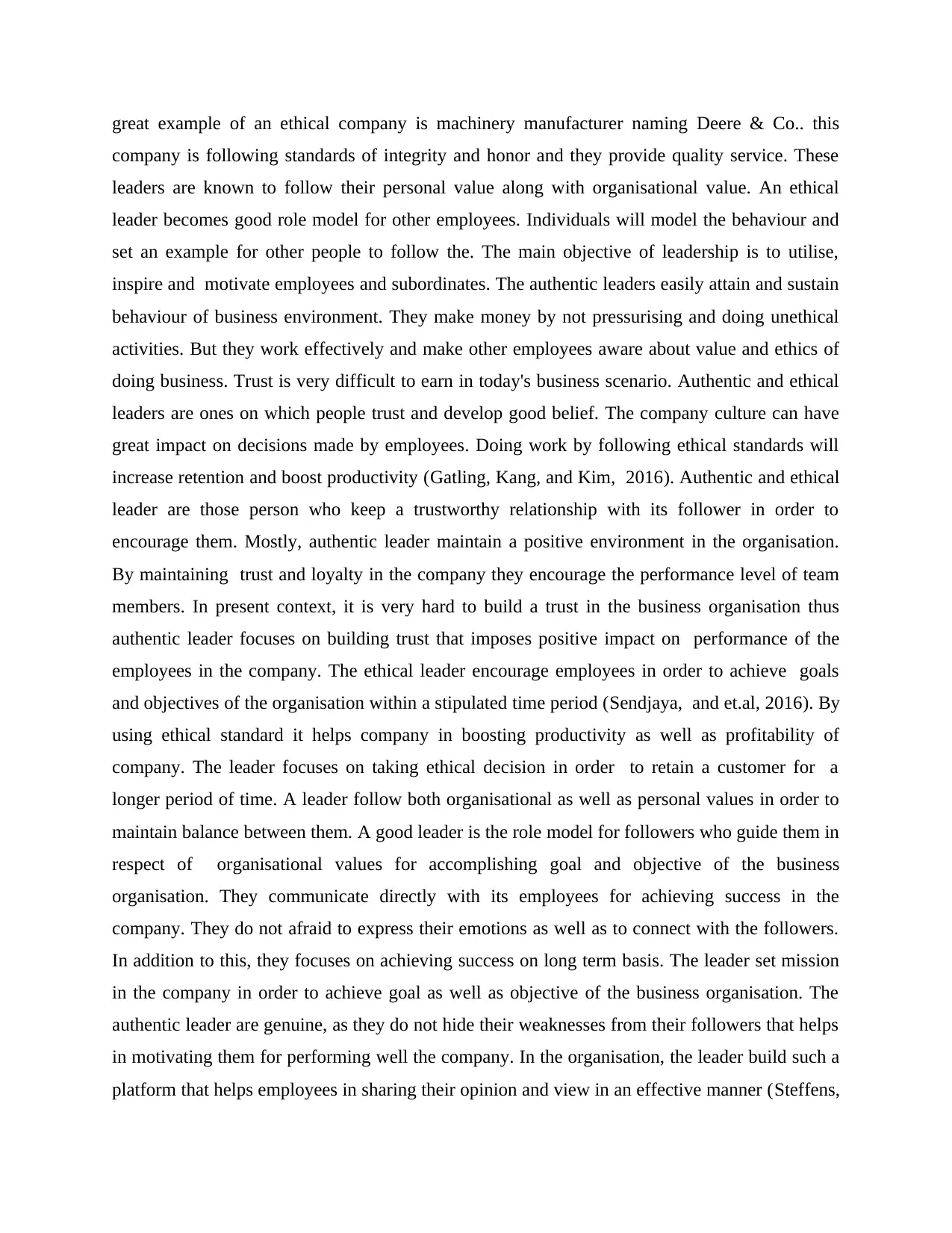
great example of an ethical company is machinery manufacturer naming Deere & Co.. this
company is following standards of integrity and honor and they provide quality service. These
leaders are known to follow their personal value along with organisational value. An ethical
leader becomes good role model for other employees. Individuals will model the behaviour and
set an example for other people to follow the. The main objective of leadership is to utilise,
inspire and motivate employees and subordinates. The authentic leaders easily attain and sustain
behaviour of business environment. They make money by not pressurising and doing unethical
activities. But they work effectively and make other employees aware about value and ethics of
doing business. Trust is very difficult to earn in today's business scenario. Authentic and ethical
leaders are ones on which people trust and develop good belief. The company culture can have
great impact on decisions made by employees. Doing work by following ethical standards will
increase retention and boost productivity (Gatling, Kang, and Kim, 2016). Authentic and ethical
leader are those person who keep a trustworthy relationship with its follower in order to
encourage them. Mostly, authentic leader maintain a positive environment in the organisation.
By maintaining trust and loyalty in the company they encourage the performance level of team
members. In present context, it is very hard to build a trust in the business organisation thus
authentic leader focuses on building trust that imposes positive impact on performance of the
employees in the company. The ethical leader encourage employees in order to achieve goals
and objectives of the organisation within a stipulated time period (Sendjaya, and et.al, 2016). By
using ethical standard it helps company in boosting productivity as well as profitability of
company. The leader focuses on taking ethical decision in order to retain a customer for a
longer period of time. A leader follow both organisational as well as personal values in order to
maintain balance between them. A good leader is the role model for followers who guide them in
respect of organisational values for accomplishing goal and objective of the business
organisation. They communicate directly with its employees for achieving success in the
company. They do not afraid to express their emotions as well as to connect with the followers.
In addition to this, they focuses on achieving success on long term basis. The leader set mission
in the company in order to achieve goal as well as objective of the business organisation. The
authentic leader are genuine, as they do not hide their weaknesses from their followers that helps
in motivating them for performing well the company. In the organisation, the leader build such a
platform that helps employees in sharing their opinion and view in an effective manner (Steffens,
company is following standards of integrity and honor and they provide quality service. These
leaders are known to follow their personal value along with organisational value. An ethical
leader becomes good role model for other employees. Individuals will model the behaviour and
set an example for other people to follow the. The main objective of leadership is to utilise,
inspire and motivate employees and subordinates. The authentic leaders easily attain and sustain
behaviour of business environment. They make money by not pressurising and doing unethical
activities. But they work effectively and make other employees aware about value and ethics of
doing business. Trust is very difficult to earn in today's business scenario. Authentic and ethical
leaders are ones on which people trust and develop good belief. The company culture can have
great impact on decisions made by employees. Doing work by following ethical standards will
increase retention and boost productivity (Gatling, Kang, and Kim, 2016). Authentic and ethical
leader are those person who keep a trustworthy relationship with its follower in order to
encourage them. Mostly, authentic leader maintain a positive environment in the organisation.
By maintaining trust and loyalty in the company they encourage the performance level of team
members. In present context, it is very hard to build a trust in the business organisation thus
authentic leader focuses on building trust that imposes positive impact on performance of the
employees in the company. The ethical leader encourage employees in order to achieve goals
and objectives of the organisation within a stipulated time period (Sendjaya, and et.al, 2016). By
using ethical standard it helps company in boosting productivity as well as profitability of
company. The leader focuses on taking ethical decision in order to retain a customer for a
longer period of time. A leader follow both organisational as well as personal values in order to
maintain balance between them. A good leader is the role model for followers who guide them in
respect of organisational values for accomplishing goal and objective of the business
organisation. They communicate directly with its employees for achieving success in the
company. They do not afraid to express their emotions as well as to connect with the followers.
In addition to this, they focuses on achieving success on long term basis. The leader set mission
in the company in order to achieve goal as well as objective of the business organisation. The
authentic leader are genuine, as they do not hide their weaknesses from their followers that helps
in motivating them for performing well the company. In the organisation, the leader build such a
platform that helps employees in sharing their opinion and view in an effective manner (Steffens,
Paraphrase This Document
Need a fresh take? Get an instant paraphrase of this document with our AI Paraphraser
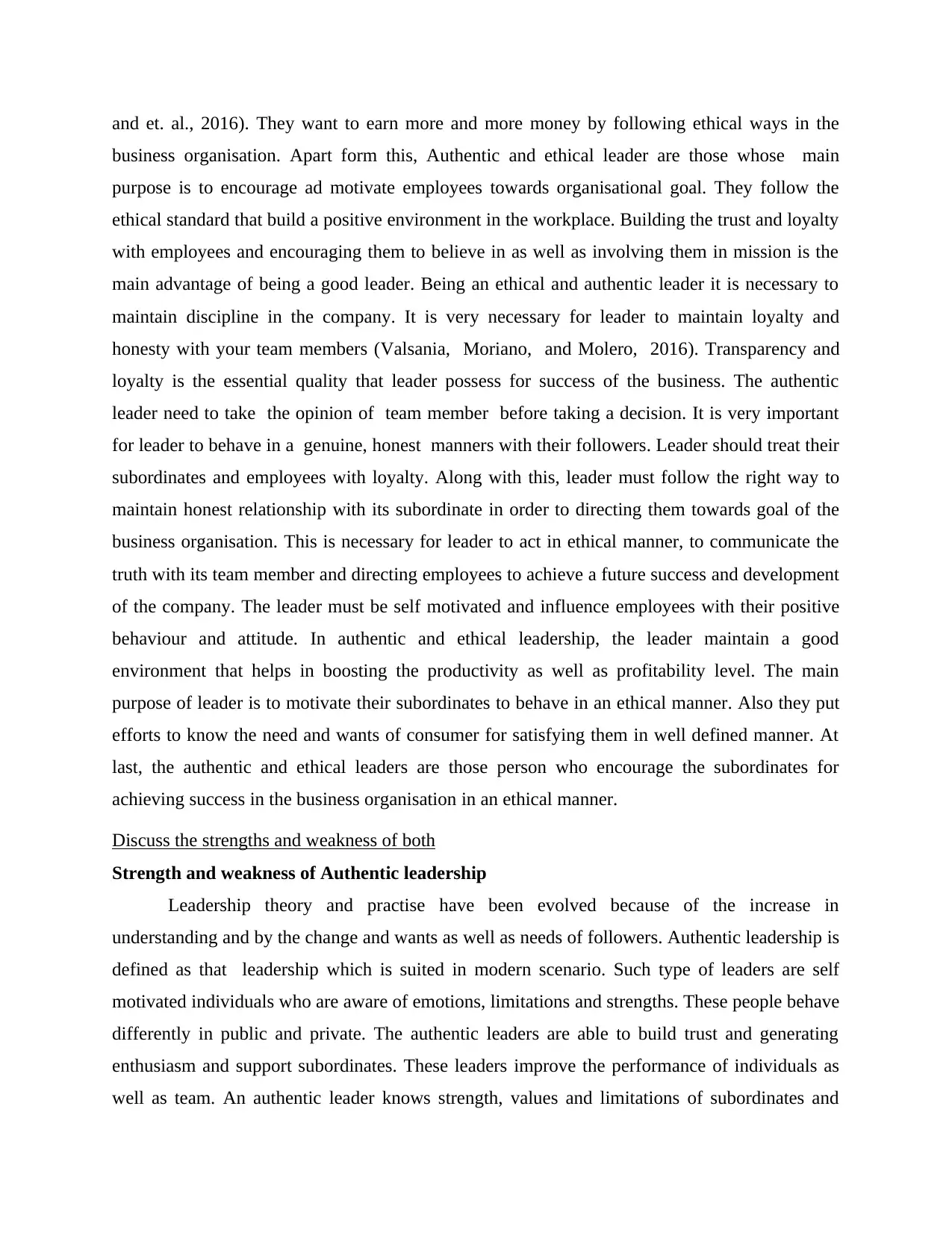
and et. al., 2016). They want to earn more and more money by following ethical ways in the
business organisation. Apart form this, Authentic and ethical leader are those whose main
purpose is to encourage ad motivate employees towards organisational goal. They follow the
ethical standard that build a positive environment in the workplace. Building the trust and loyalty
with employees and encouraging them to believe in as well as involving them in mission is the
main advantage of being a good leader. Being an ethical and authentic leader it is necessary to
maintain discipline in the company. It is very necessary for leader to maintain loyalty and
honesty with your team members (Valsania, Moriano, and Molero, 2016). Transparency and
loyalty is the essential quality that leader possess for success of the business. The authentic
leader need to take the opinion of team member before taking a decision. It is very important
for leader to behave in a genuine, honest manners with their followers. Leader should treat their
subordinates and employees with loyalty. Along with this, leader must follow the right way to
maintain honest relationship with its subordinate in order to directing them towards goal of the
business organisation. This is necessary for leader to act in ethical manner, to communicate the
truth with its team member and directing employees to achieve a future success and development
of the company. The leader must be self motivated and influence employees with their positive
behaviour and attitude. In authentic and ethical leadership, the leader maintain a good
environment that helps in boosting the productivity as well as profitability level. The main
purpose of leader is to motivate their subordinates to behave in an ethical manner. Also they put
efforts to know the need and wants of consumer for satisfying them in well defined manner. At
last, the authentic and ethical leaders are those person who encourage the subordinates for
achieving success in the business organisation in an ethical manner.
Discuss the strengths and weakness of both
Strength and weakness of Authentic leadership
Leadership theory and practise have been evolved because of the increase in
understanding and by the change and wants as well as needs of followers. Authentic leadership is
defined as that leadership which is suited in modern scenario. Such type of leaders are self
motivated individuals who are aware of emotions, limitations and strengths. These people behave
differently in public and private. The authentic leaders are able to build trust and generating
enthusiasm and support subordinates. These leaders improve the performance of individuals as
well as team. An authentic leader knows strength, values and limitations of subordinates and
business organisation. Apart form this, Authentic and ethical leader are those whose main
purpose is to encourage ad motivate employees towards organisational goal. They follow the
ethical standard that build a positive environment in the workplace. Building the trust and loyalty
with employees and encouraging them to believe in as well as involving them in mission is the
main advantage of being a good leader. Being an ethical and authentic leader it is necessary to
maintain discipline in the company. It is very necessary for leader to maintain loyalty and
honesty with your team members (Valsania, Moriano, and Molero, 2016). Transparency and
loyalty is the essential quality that leader possess for success of the business. The authentic
leader need to take the opinion of team member before taking a decision. It is very important
for leader to behave in a genuine, honest manners with their followers. Leader should treat their
subordinates and employees with loyalty. Along with this, leader must follow the right way to
maintain honest relationship with its subordinate in order to directing them towards goal of the
business organisation. This is necessary for leader to act in ethical manner, to communicate the
truth with its team member and directing employees to achieve a future success and development
of the company. The leader must be self motivated and influence employees with their positive
behaviour and attitude. In authentic and ethical leadership, the leader maintain a good
environment that helps in boosting the productivity as well as profitability level. The main
purpose of leader is to motivate their subordinates to behave in an ethical manner. Also they put
efforts to know the need and wants of consumer for satisfying them in well defined manner. At
last, the authentic and ethical leaders are those person who encourage the subordinates for
achieving success in the business organisation in an ethical manner.
Discuss the strengths and weakness of both
Strength and weakness of Authentic leadership
Leadership theory and practise have been evolved because of the increase in
understanding and by the change and wants as well as needs of followers. Authentic leadership is
defined as that leadership which is suited in modern scenario. Such type of leaders are self
motivated individuals who are aware of emotions, limitations and strengths. These people behave
differently in public and private. The authentic leaders are able to build trust and generating
enthusiasm and support subordinates. These leaders improve the performance of individuals as
well as team. An authentic leader knows strength, values and limitations of subordinates and
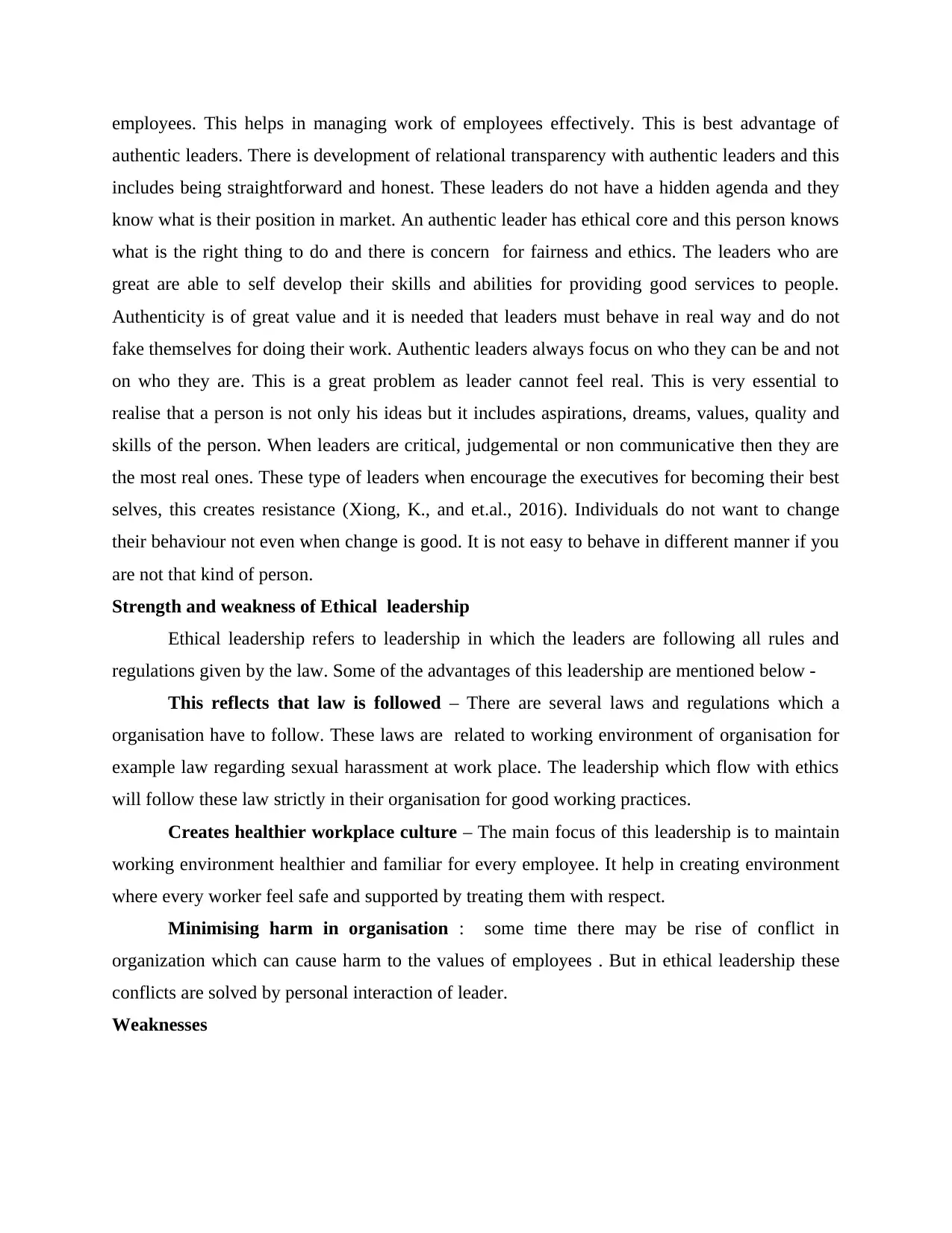
employees. This helps in managing work of employees effectively. This is best advantage of
authentic leaders. There is development of relational transparency with authentic leaders and this
includes being straightforward and honest. These leaders do not have a hidden agenda and they
know what is their position in market. An authentic leader has ethical core and this person knows
what is the right thing to do and there is concern for fairness and ethics. The leaders who are
great are able to self develop their skills and abilities for providing good services to people.
Authenticity is of great value and it is needed that leaders must behave in real way and do not
fake themselves for doing their work. Authentic leaders always focus on who they can be and not
on who they are. This is a great problem as leader cannot feel real. This is very essential to
realise that a person is not only his ideas but it includes aspirations, dreams, values, quality and
skills of the person. When leaders are critical, judgemental or non communicative then they are
the most real ones. These type of leaders when encourage the executives for becoming their best
selves, this creates resistance (Xiong, K., and et.al., 2016). Individuals do not want to change
their behaviour not even when change is good. It is not easy to behave in different manner if you
are not that kind of person.
Strength and weakness of Ethical leadership
Ethical leadership refers to leadership in which the leaders are following all rules and
regulations given by the law. Some of the advantages of this leadership are mentioned below -
This reflects that law is followed – There are several laws and regulations which a
organisation have to follow. These laws are related to working environment of organisation for
example law regarding sexual harassment at work place. The leadership which flow with ethics
will follow these law strictly in their organisation for good working practices.
Creates healthier workplace culture – The main focus of this leadership is to maintain
working environment healthier and familiar for every employee. It help in creating environment
where every worker feel safe and supported by treating them with respect.
Minimising harm in organisation : some time there may be rise of conflict in
organization which can cause harm to the values of employees . But in ethical leadership these
conflicts are solved by personal interaction of leader.
Weaknesses
authentic leaders. There is development of relational transparency with authentic leaders and this
includes being straightforward and honest. These leaders do not have a hidden agenda and they
know what is their position in market. An authentic leader has ethical core and this person knows
what is the right thing to do and there is concern for fairness and ethics. The leaders who are
great are able to self develop their skills and abilities for providing good services to people.
Authenticity is of great value and it is needed that leaders must behave in real way and do not
fake themselves for doing their work. Authentic leaders always focus on who they can be and not
on who they are. This is a great problem as leader cannot feel real. This is very essential to
realise that a person is not only his ideas but it includes aspirations, dreams, values, quality and
skills of the person. When leaders are critical, judgemental or non communicative then they are
the most real ones. These type of leaders when encourage the executives for becoming their best
selves, this creates resistance (Xiong, K., and et.al., 2016). Individuals do not want to change
their behaviour not even when change is good. It is not easy to behave in different manner if you
are not that kind of person.
Strength and weakness of Ethical leadership
Ethical leadership refers to leadership in which the leaders are following all rules and
regulations given by the law. Some of the advantages of this leadership are mentioned below -
This reflects that law is followed – There are several laws and regulations which a
organisation have to follow. These laws are related to working environment of organisation for
example law regarding sexual harassment at work place. The leadership which flow with ethics
will follow these law strictly in their organisation for good working practices.
Creates healthier workplace culture – The main focus of this leadership is to maintain
working environment healthier and familiar for every employee. It help in creating environment
where every worker feel safe and supported by treating them with respect.
Minimising harm in organisation : some time there may be rise of conflict in
organization which can cause harm to the values of employees . But in ethical leadership these
conflicts are solved by personal interaction of leader.
Weaknesses
⊘ This is a preview!⊘
Do you want full access?
Subscribe today to unlock all pages.

Trusted by 1+ million students worldwide
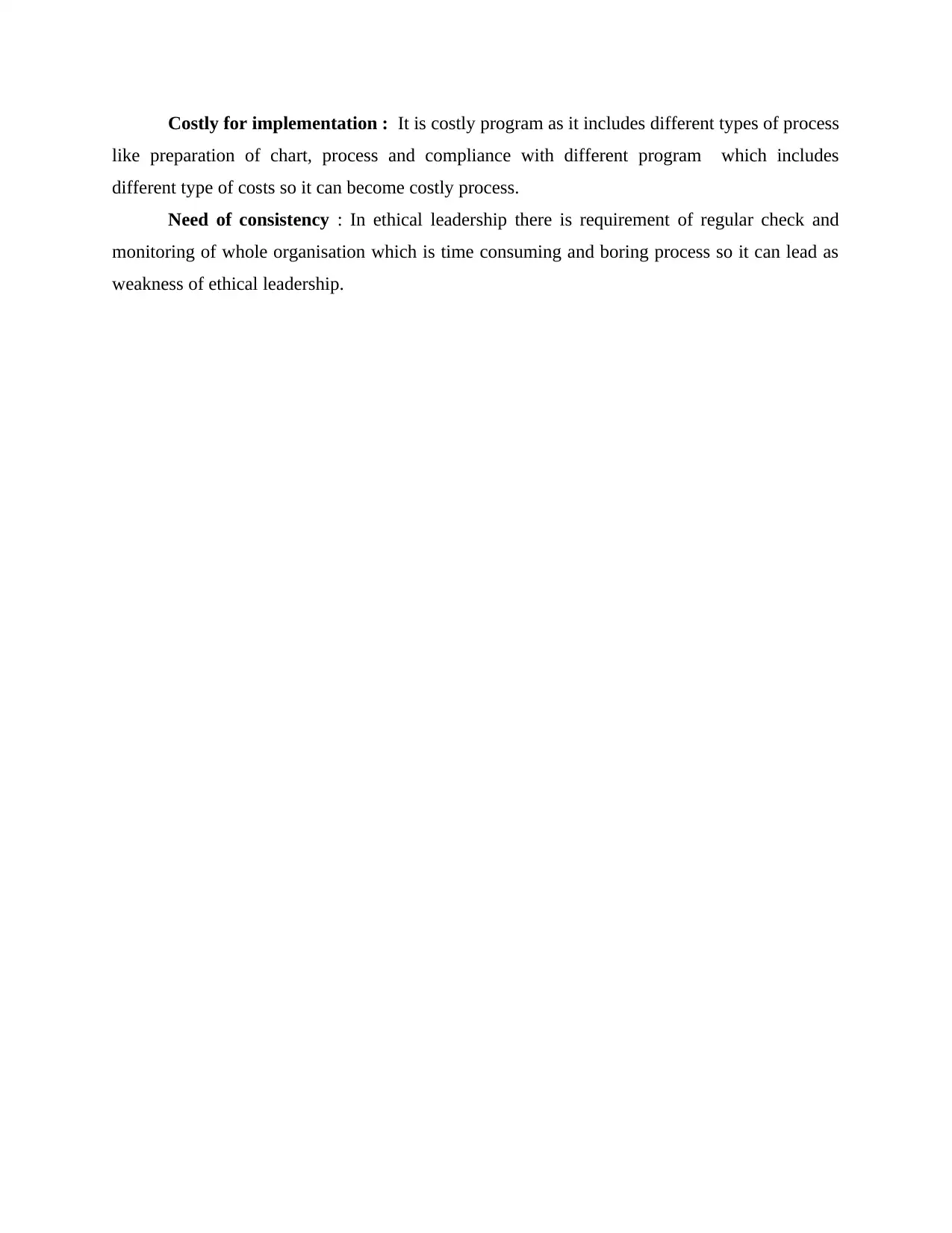
Costly for implementation : It is costly program as it includes different types of process
like preparation of chart, process and compliance with different program which includes
different type of costs so it can become costly process.
Need of consistency : In ethical leadership there is requirement of regular check and
monitoring of whole organisation which is time consuming and boring process so it can lead as
weakness of ethical leadership.
like preparation of chart, process and compliance with different program which includes
different type of costs so it can become costly process.
Need of consistency : In ethical leadership there is requirement of regular check and
monitoring of whole organisation which is time consuming and boring process so it can lead as
weakness of ethical leadership.
Paraphrase This Document
Need a fresh take? Get an instant paraphrase of this document with our AI Paraphraser
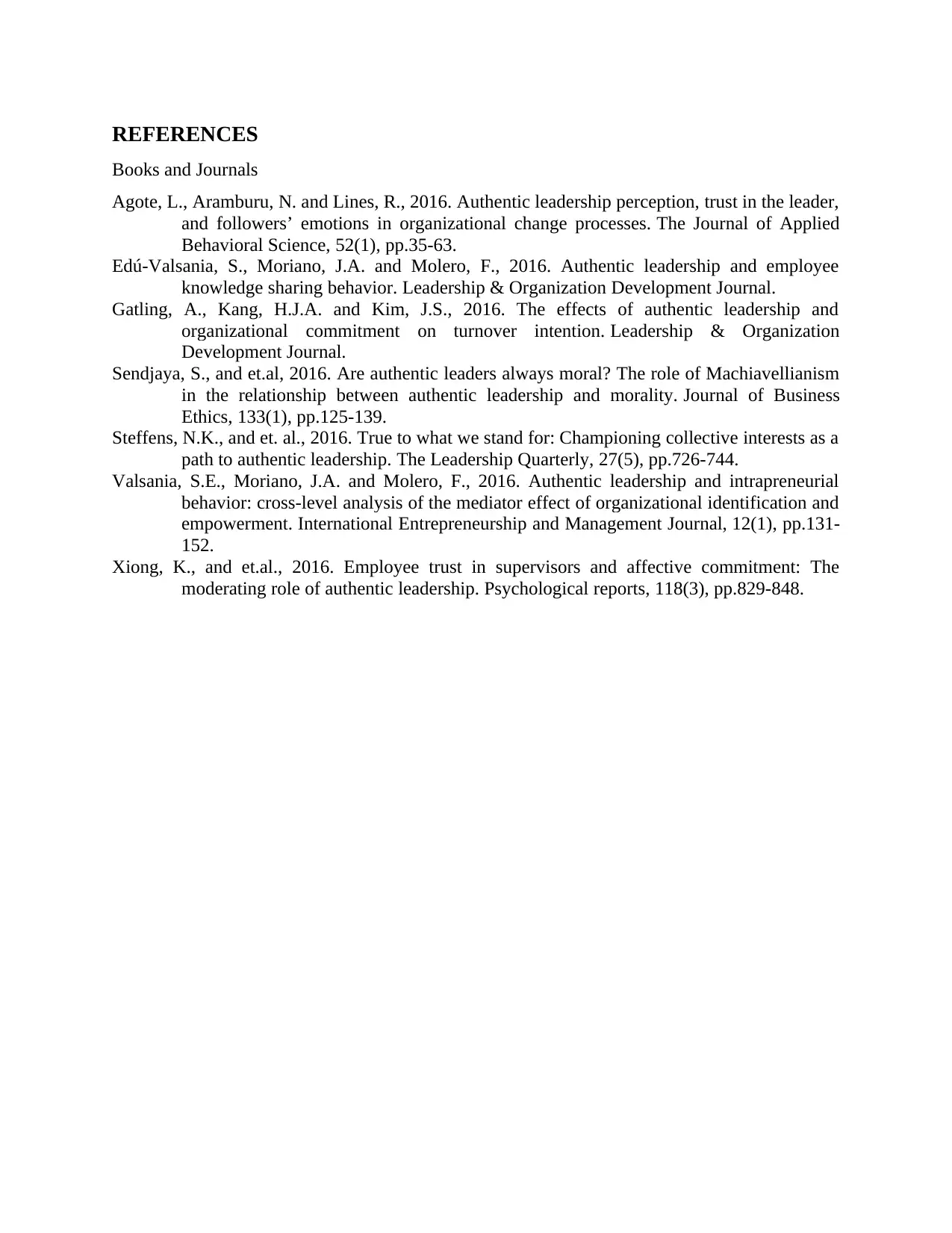
REFERENCES
Books and Journals
Agote, L., Aramburu, N. and Lines, R., 2016. Authentic leadership perception, trust in the leader,
and followers’ emotions in organizational change processes. The Journal of Applied
Behavioral Science, 52(1), pp.35-63.
Edú-Valsania, S., Moriano, J.A. and Molero, F., 2016. Authentic leadership and employee
knowledge sharing behavior. Leadership & Organization Development Journal.
Gatling, A., Kang, H.J.A. and Kim, J.S., 2016. The effects of authentic leadership and
organizational commitment on turnover intention. Leadership & Organization
Development Journal.
Sendjaya, S., and et.al, 2016. Are authentic leaders always moral? The role of Machiavellianism
in the relationship between authentic leadership and morality. Journal of Business
Ethics, 133(1), pp.125-139.
Steffens, N.K., and et. al., 2016. True to what we stand for: Championing collective interests as a
path to authentic leadership. The Leadership Quarterly, 27(5), pp.726-744.
Valsania, S.E., Moriano, J.A. and Molero, F., 2016. Authentic leadership and intrapreneurial
behavior: cross-level analysis of the mediator effect of organizational identification and
empowerment. International Entrepreneurship and Management Journal, 12(1), pp.131-
152.
Xiong, K., and et.al., 2016. Employee trust in supervisors and affective commitment: The
moderating role of authentic leadership. Psychological reports, 118(3), pp.829-848.
Books and Journals
Agote, L., Aramburu, N. and Lines, R., 2016. Authentic leadership perception, trust in the leader,
and followers’ emotions in organizational change processes. The Journal of Applied
Behavioral Science, 52(1), pp.35-63.
Edú-Valsania, S., Moriano, J.A. and Molero, F., 2016. Authentic leadership and employee
knowledge sharing behavior. Leadership & Organization Development Journal.
Gatling, A., Kang, H.J.A. and Kim, J.S., 2016. The effects of authentic leadership and
organizational commitment on turnover intention. Leadership & Organization
Development Journal.
Sendjaya, S., and et.al, 2016. Are authentic leaders always moral? The role of Machiavellianism
in the relationship between authentic leadership and morality. Journal of Business
Ethics, 133(1), pp.125-139.
Steffens, N.K., and et. al., 2016. True to what we stand for: Championing collective interests as a
path to authentic leadership. The Leadership Quarterly, 27(5), pp.726-744.
Valsania, S.E., Moriano, J.A. and Molero, F., 2016. Authentic leadership and intrapreneurial
behavior: cross-level analysis of the mediator effect of organizational identification and
empowerment. International Entrepreneurship and Management Journal, 12(1), pp.131-
152.
Xiong, K., and et.al., 2016. Employee trust in supervisors and affective commitment: The
moderating role of authentic leadership. Psychological reports, 118(3), pp.829-848.
1 out of 8
Related Documents
Your All-in-One AI-Powered Toolkit for Academic Success.
+13062052269
info@desklib.com
Available 24*7 on WhatsApp / Email
![[object Object]](/_next/static/media/star-bottom.7253800d.svg)
Unlock your academic potential
Copyright © 2020–2026 A2Z Services. All Rights Reserved. Developed and managed by ZUCOL.





